Text
as endearing as kim dokja wanting a really big house to live everyone else is considering his upbringing, it's also really funny in the meta sense for me. like i remember one of the most common plots / tropes within fanfics i read back then was just lassoing all their favorite characters within the fandom together and letting them be comfy, silly lil fellas.
#orv#orv spoilers#kim dokja#uhh pokemon fanfics are my reference here#wait isnt that just the sun moon and anime
0 notes
Text

Nah, he did not need to say "it doesn't sit right with me" in this context like ok jokester💀
#miri sugo#csm 139#chainsaw man 139#okay but was this the translation team having creative liberty or...#it's time for someone to make a 2000 word symbolic analysis for this silly little running gag#sugo miri#csm spoilers#chainsawman spoilers
221 notes
·
View notes
Text
Immortality and Boredom: Euclase Analysis
Note: this has been taken from my Twitter thread, but there's some edits I've been wanting to make, and generally multi-platform access is a good thing, especially here with how tags work on this site as well the amount of Euclase metas already present here.
It feels a bit academically awkward to base this analysis off of Western philosophy knowing the series' Buddhist influences, but the former's concise terminology helps illuminate the series without any evident conflicts. Conveniently, I have only needed to base this thread off of one source: "Immortality and Boredom" by John Martin Fischer and Benjamin Mitchell-Yellin.
If one believes that immortality necessarily causes boredom, Fischer and Mitchell-Yellin have observed two notable ways in which one could make this argument. One way, coined as "content-boredom", argues that immortality would eventually exhaust the supposed finite amount of desires that would drive a person to live (Fischer and Mitchell-Yellin 355). This is partially shown through the Lunarians. Their desire to pass on stems from the resignation that they have done everything that could bring any sort of pleasure. The Lunarian's problems regarding immortality do not stem from content-boredom, for there is a more existential component present, but it is a real factor. Content-boredom is limited to the Lunarians, for they, outside of Kongo, have lived much longer than anyone else.
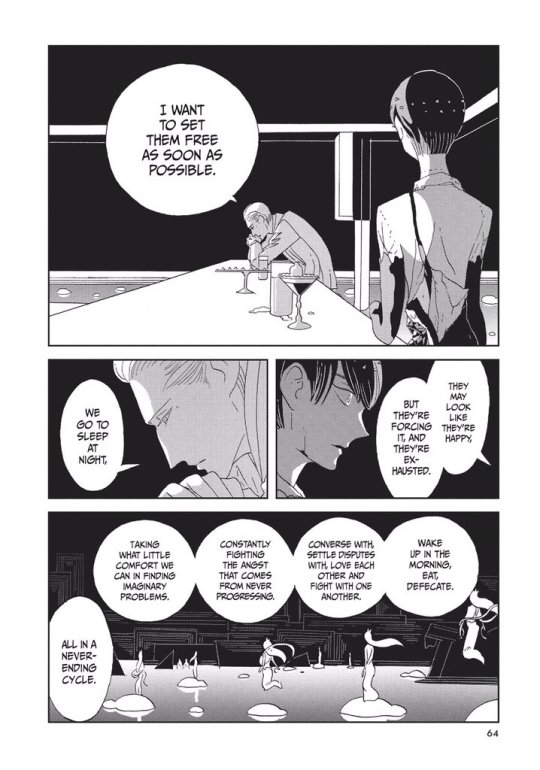
The other way to argue immortality that causes boredom is to say that an immortal life would not be constrained by time, and, therefore, lack a certain urgency. Lacking the energy to actualize one's desires and complete projects would make life dull. This is labeled as "motivation-boredom" (361). While perhaps not as intuitive argument as content-boredom, motivation-boredom is an application of the common practice of procrastination at its most extreme. Where one may put off a task until the last possible moment despite wanting and knowing that they should have started that task earlier, people who support the idea of motivation-boredom believe people can and will put off everything indefinitely since there is no last possible moment. Motivation-boredom is best substantiated through the Earth Gems, but most importantly, through Euclase, an elder gem who displays more apparent control over the Earth Gems as the series progresses. Showing how this is the case is what the real meat of this post is.
First of all, Euclase's role in demonstrating motivation-boredom is something only Euclase can properly do. The other elder gems (i.e. Yellow Diamond, Padparadscha, and Alexandrite), are caught in problems regarding immortality that are outside of boredom. The same reasoning applies to Kongo.
Ironically, they acknowledge the idea that immortal existence fundamentally differs from mortals in a psychological sense, but they (through their own admission) ultimately seem unaware of how motivation-boredom affects their judgments. Before any budding criticism comes to mind in how the previous tweet is phrased, Euclase does only mention that an immortal being's sense of danger being distorted—not necessarily an immortal being's sense of urgency being distorted. However, the following paragraphs should demonstrate the compatibility and sometimes interchangeability between the two traits. Euclase's distorted sense of danger is actually rooted in Euclase's distorted sense of urgency.
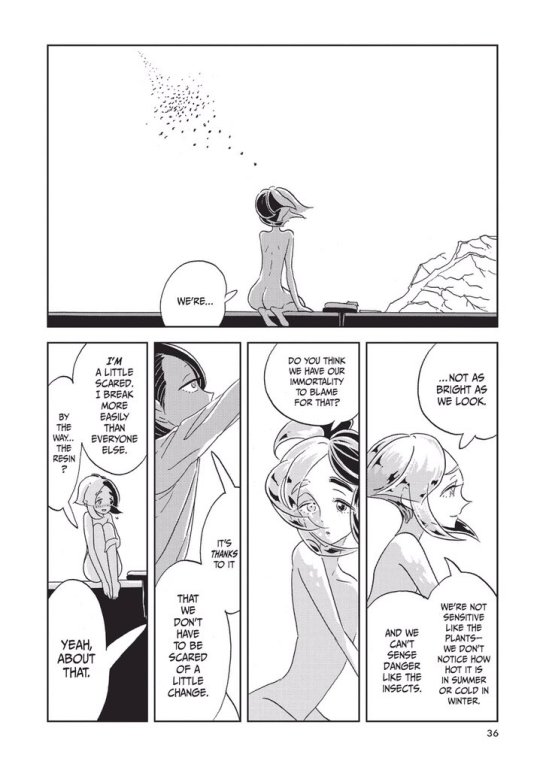
Relative to other gems in the series, Euclase's conversations take a lot of focus on temporality. There are many examples. In fact, Chapter 4, their first major appearance, foreshadows this tendency. The third image shows a juxtaposition between Euclase and Phos in valuing time.
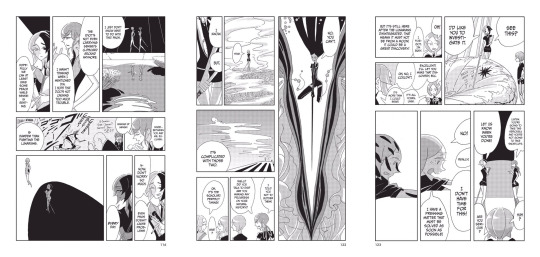
Another example early in the series (one in which credit goes to Shamu, for he pointed this out during our note-taking process of this video) takes place during Chapter 7 when Jade reports that Euclase dropped their schedule and is in need of more time to reassign roles for the future. The reason is indirectly linked to Phos, which hints at how Phos will impact Euclase’s future.

Euclase, contrasting from the Lunarians, values the benefits that come from the lack of urgency. With infinite time comes the infinite opportunities for conflicts to resolve. The earliest moments where this sentiment shows itself is through Chapter 41 and Chapter 58.
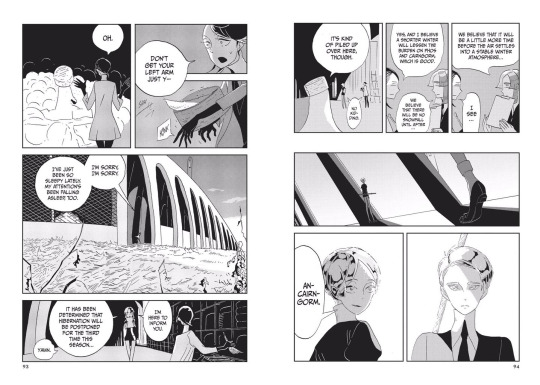
While a bit digressive for this analysis, Euclase's word choice incorporates time once more to compliment Phos' condition by returning from the moon in Chapter 58. There is an irony here in that Euclase's support for the idea that a lack of urgency eventually will towards positive outcomes through patience is vindicated through Phos. Euclase's encouragement to Phos could have only happened through the systemic neglect that Phos is under.

Chapters 60 and 61 display where motivation-boredom's consequences start to directly impact the plot. Euclase recognizes the threat Phos poses but fails to enact any action outside of sharing their suspicion to Jade and expressing an ambiguous threat towards Phos. Euclase failure here stems from two reasons. One is that Euclase misreads the identity of Phos. Lapis is a gem known for their analysis paralysis. Euclase, by believing Lapis has the most control over LaPhos, assumes that Phos would not follow through any plans with such haste. Furthermore, by predicting their actions through the Lapis-colored lens, they fail to consider what would happen if really is Phos in control, a gem that carries human-like tendencies to carry out tasks with an urgency.

The second reason originates from Euclase's inability to detect time constraints. Notice the juxtaposition between Euclase and Phos here: the threat not only fails to prevents the gems departing for the moon but actually hastens the result.

Even though Euclase manages to prevent a few gems from leaving the moon, it's a pyrrhic victory, suggesting once more how Euclase's inability to feel urgency causes negative results. Consider Rutile, whom Euclase successfully prevents from going to the moon. Rutile could have served as a pivotal piece in preventing the departure to the moon, for they were the only one to consider disseminating Phos’ plan to Kongo. Instead, Rutile’s psyche starts to take a turn for the worse in the series. Euclase’s failure here is multilayered.
Euclase starts to recognize urgency more due to Phos. Kongo's pending request for a self-imposed exile forces Euclase into action. Why Euclase feels compulsion to stay on Earth is slightly outside the scope of this post, but Euclase's argument for staying on Earth lies in identity and its connection to time. Note that Euclase's urge to make up each other's shortcomings results from Phos' actions as well as Kongo's response being tied to the relationship future life forms and the present day.
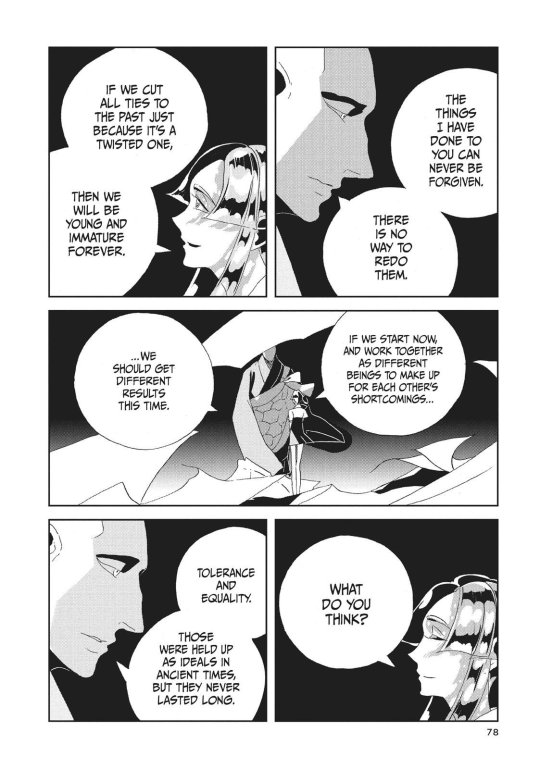
The scouting mission in Chapter 69 implies that Euclase's natural state is one that tries to maintain a state that avoids urgency when they can. Pad's analysis, considering their constant state of inactivity, suggests that Euclase's character has been unchanging for a while. The threat of Phos does urge Euclase and the Earth gems to respond with a defensive plan, however, as seen in Chapter 70. The following interaction between Phos and Euclase centers once more on time.

Euclase's decision for everyone to rest after the night raid lies upon the premise that relationship between Phos and the Lunarians is currently one of dysfunction. Urgency to act only comes when the danger is immediate and the time constraints are evident for Euclase.
When Phos is separated for 220 years, Euclase once again approaches the problem under the assumption that the amount of time to solve all the conflicts with Phos is not constrained by time. The following chapter shows Euclase's belief that Phos no longer endangers their safety; the small amount of motivation they have to ask Kongo to pray is caused not out of sympathy for Phos but instead of out consideration of the possibility that that Lunarians might invade.
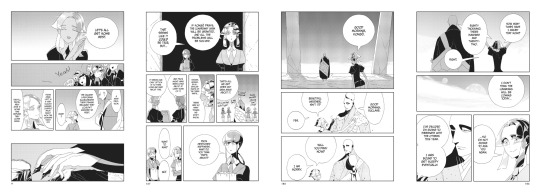
While Euclase's reasoning to delay cleaning up during Kongo's birthday party may have justifiable reasoning, it does show how motivation-boredom even plays a part in casual situations.

Upon recognizing danger from Phos' imminent invasion, Euclase's response is to buy time, which seems rather indicative that their response to urgency is infinitely delay whatever causes urgency.

Through Alexandrite's action sequence, due to the positioning of Euclase at the start of the sequence compared to the other images, it almost seems as if Euclase is trying to delay inevitable danger by using their companions to buy time.
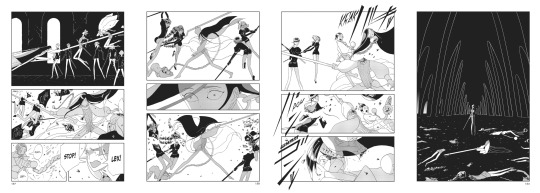
Based on Euclase's previous actions, their reasoning for their negotiation plea towards Phos expresses sincerity. However, as time has proven before, Phos shows that they need to be the danger in order for goals and desires to be reached. Euclase's shortcomings show that becoming immortal does not mean everything can be put off until later.
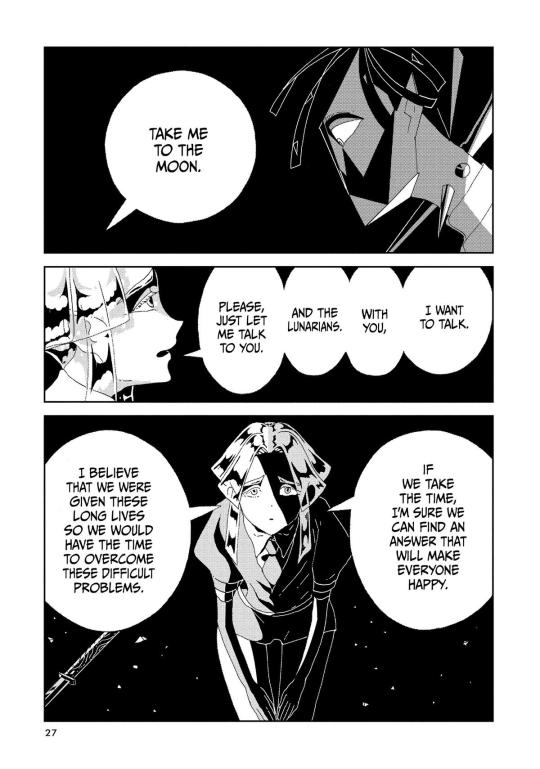
When wondering why Euclase fails to get anything done later in the series, a serious factor to consider is the influence of motivation-boredom. Euclase's passivity may not be entirely based on intentional callousness, for their existence and their relation to time distorts all decision making, and living as they have distances themselves from a perspective like Phos' and reinforces those distortions.
To wrap everything up, Houseki no Kuni frequently criticizes immortality. Does the depiction of both kinds of boredom claim are aspects that necessarily happen to those who have immortality? No. In a sense the two types of boredoms oppose one another, yet they coexist in this story. However, having these two kinds of boredoms correspond to a respective immortal species shows how these criticisms could happen to those who are immortal. Additionally, unlike content-boredom within Houseki no Kuni, motivation-boredom does not directly lead to unhappiness for reasons concerning the lack of energy to fulfill desires like its supporters suggest. Instead, the manga shows that those in power who lack urgency due to their immortality can lead to excessive and idle conservatism and eventual, destructive consequences by not recognizing and responding to time-sensitive issues. To me, that sounds more like a warning rather than a criticism.
The paper summarizes both types of boredoms, but interestingly, they reject these two concepts as sufficient reasons to oppose immortality. Originally, before making this post, I did not think either forms of boredoms had any merit, but analyzing Euclase has shown me that immortality would, while not necessarily causing motivation-boredom, a distortion of urgency within projects that would require it, thereby risking to harm one's quality of living. Furthermore, for supporters of content-boredom, reading "The Makropulos case: reflections on the tedium of immortality" by Bernard Williams may interest you. For supporters of motivation-boredom, I cannot say I have read them, but Fischer and Mitchell-Yellin's response on content boredom is based off of Todd May's "Death" and Martha Nussbaum's "The Therapy of Desire".
Fischer, John Martin, and Benjamin Mitchell-Yellin. “Immortality and Boredom.” The Journal of Ethics, vol. 18, no. 4, 2014, pp. 353–72. JSTOR, http://www.jstor.org/stable/43895884.
65 notes
·
View notes